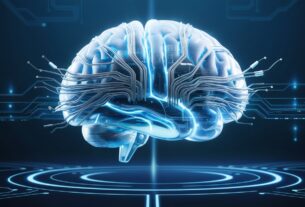The Global Impact of Artificial Intelligence:
Artificial Intelligence (AI) has become one of the most transformative forces in the world, reshaping industries, redefining economies, and influencing the very fabric of human society. From autonomous vehicles to advanced healthcare diagnostics, AI is no longer a futuristic concept but an integral part of our daily lives. Its rapid growth raises both excitement and concerns, prompting global discussions on ethics, regulations, and future prospects. This article delves into how AI is shaping different regions worldwide, its benefits, and the challenges it poses.
AI in North America: Pioneering Innovation and Ethical Challenges
North America, particularly the United States and Canada, has positioned itself at the forefront of AI research and implementation. Silicon Valley remains a global hub for AI development, hosting major tech giants like Google, Apple, Microsoft, and Meta, which invest billions in machine learning and automation technologies.
One of the most significant contributions of AI in North America is its role in automation and robotics. From self-driving cars developed by Tesla and Waymo to natural language processing models such as OpenAI’s GPT, AI is driving innovation at an unprecedented pace. In healthcare, AI-powered tools assist in diagnosing diseases such as cancer and predicting patient outcomes, significantly improving efficiency and accuracy.
However, AI’s rapid expansion in North America also raises concerns about ethical dilemmas and privacy issues. Algorithms often reflect biases present in their training data, leading to discrimination in hiring practices, policing, and even healthcare recommendations. Governments and institutions are working to implement stricter regulations, with the European-style AI Act being considered in different forms within the U.S. legislative landscape.

AI in Europe: Balancing Innovation with Regulation
Europe has taken a distinct approach to AI, emphasizing ethical frameworks and stringent regulations to ensure responsible development. The European Union (EU) has been proactive in establishing AI policies that prioritize human rights and transparency. The General Data Protection Regulation (GDPR) already enforces strict data privacy standards, influencing AI-driven decision-making systems.
Countries like Germany, the UK, and France have emerged as leaders in AI research and application. The UK, for instance, has heavily invested in AI-driven financial technologies (FinTech), while Germany is leveraging AI to optimize industrial automation and manufacturing. Meanwhile, Scandinavian countries focus on AI in healthcare and sustainable development.
Despite its structured regulatory environment, Europe faces challenges in competing with the U.S. and China in AI scalability. The continent’s fragmented AI ecosystem, due to varying national policies, makes it difficult to create a unified AI superpower. However, Europe’s focus on ethical AI development could set a global standard, ensuring responsible AI implementation worldwide.
AI in Asia: Technological Advancements and Mass Implementation
Asia, particularly China, Japan, and South Korea, has rapidly embraced AI, integrating it into various sectors, from finance to national security. China, often regarded as an AI superpower, has made enormous strides in AI development. With government-backed initiatives such as the “New Generation AI Development Plan,” China aims to become the global leader in AI by 2030.
AI applications in China range from facial recognition technology used in security systems to AI-driven financial services. The country’s extensive use of AI in surveillance has sparked debates over privacy concerns and state control. However, its advancements in AI healthcare, autonomous transportation, and smart cities demonstrate AI’s potential to improve urban living standards.
Japan and South Korea also play significant roles in AI innovation. Japan’s focus on robotics has led to the development of humanoid robots capable of assisting in elderly care and customer service. South Korea, home to tech giants like Samsung and LG, is integrating AI into smart home technologies and 5G-enabled automation systems.
While Asia’s AI advancements are impressive, ethical considerations regarding data privacy, job displacement, and surveillance remain key challenges. As governments continue to push AI frontiers, they must also address public concerns to ensure widespread acceptance and trust.
AI in Africa: A Rising Digital Revolution
While Africa has traditionally lagged behind other continents in AI adoption, the region is witnessing a digital revolution fueled by AI-driven solutions. Countries like Nigeria, South Africa, and Kenya are leveraging AI to address socio-economic challenges, particularly in agriculture, healthcare, and financial inclusion.
In agriculture, AI-powered solutions help farmers predict weather patterns, detect crop diseases, and optimize yields. Healthcare applications, such as AI-driven diagnostics for diseases like malaria and tuberculosis, are enhancing medical care in remote regions. Additionally, AI-driven mobile banking solutions are expanding financial inclusion, enabling millions of Africans to access banking services without traditional infrastructure.
However, Africa faces significant obstacles in AI development, including limited access to quality data, a shortage of AI talent, and inadequate infrastructure. Despite these challenges, initiatives such as Google’s AI Research Lab in Ghana signal a promising future for AI in the continent, paving the way for inclusive technological growth.
AI in Latin America: Bridging Gaps through Innovation
Latin America is gradually integrating AI into its economic and social sectors, with countries like Brazil, Mexico, and Argentina leading the way. AI applications in the region focus on areas such as education, healthcare, and business automation.
In education, AI-powered tools help personalize learning experiences, catering to students’ individual needs. In healthcare, AI-driven predictive models assist in diagnosing diseases, while chatbots and virtual assistants improve customer service across various industries. Brazil, for example, has been using AI to monitor the Amazon rainforest, detecting illegal deforestation and protecting biodiversity.
Despite these advancements, Latin America faces challenges such as limited AI funding, regulatory gaps, and a digital divide that prevents equal access to AI benefits. To maximize AI’s potential, governments and private sectors must collaborate to invest in AI education, infrastructure, and policy frameworks.
The Ethical and Social Implications of AI Worldwide
As AI continues to evolve globally, ethical and social concerns remain at the forefront of discussions. Issues such as job displacement, bias in AI decision-making, and the potential misuse of AI in surveillance and warfare require urgent attention.
Automation and AI-driven processes threaten traditional jobs, particularly in manufacturing and administrative roles. While AI creates new job opportunities, it necessitates workforce reskilling and adaptation to the digital economy. Governments must develop policies that balance AI-driven efficiency with fair employment opportunities.
Bias in AI algorithms remains a pressing issue. Since AI models learn from historical data, they may perpetuate existing prejudices, leading to unfair outcomes in hiring, law enforcement, and lending practices. Addressing this bias requires diverse AI training datasets and increased transparency in algorithmic decision-making.
The potential weaponization of AI also raises concerns. Autonomous weapons and AI-driven misinformation campaigns could destabilize global security, emphasizing the need for international cooperation on AI ethics and regulations.
The Future of AI: A Unified Global Effort
Despite challenges, AI’s future holds immense promise. If harnessed responsibly, AI can drive sustainable development, improve healthcare, and create smarter, more efficient societies. However, achieving these goals requires global collaboration, ethical AI development, and inclusive technological policies.
International organizations such as the United Nations, the World Economic Forum, and AI research communities must work together to establish AI guidelines that prioritize human well-being. Education and reskilling programs must be expanded to equip the workforce with AI-related skills, ensuring that the benefits of AI are distributed equitably.
Ultimately, AI is not merely a technological advancement—it is a societal transformation. As the world embraces this digital revolution, the collective responsibility lies in shaping AI in a way that benefits humanity as a whole. With careful planning, responsible innovation, and ethical considerations, AI can truly become a force for good in the global landscape.
The Global Impact of Artificial Intelligence:
Frequently Asked Questions (FAQ) about Artificial Intelligence (AI)
1. What is Artificial Intelligence (AI)?
AI refers to the simulation of human intelligence in machines. It enables computers and systems to perform tasks that typically require human intelligence, such as learning, problem-solving, speech recognition, and decision-making.
2. How is AI transforming industries?
AI is reshaping various industries by improving efficiency, automating repetitive tasks, and providing data-driven insights. For example, AI enhances healthcare diagnostics, streamlines financial transactions, optimizes supply chains, and powers autonomous vehicles.
3. What are some common applications of AI?
AI is used in multiple areas, including:
- Autonomous vehicles (self-driving cars)
- Virtual assistants (e.g., Siri, Alexa, Google Assistant)
- Medical diagnosis and personalized treatment
- Fraud detection in finance
- Industrial automation and robotics
- Smart home devices and IoT integration
4. How is AI being developed in different regions of the world?
- North America: A leader in AI research, home to tech giants like Google, Microsoft, and Meta, with a focus on automation and robotics. Ethical concerns and regulations are being actively discussed.
- Europe: Balances AI innovation with strong regulations and ethical frameworks, such as the GDPR and proposed AI Act.
- Asia: Rapid AI adoption, with China investing heavily in AI-driven surveillance, healthcare, and smart cities. Japan and South Korea focus on robotics and automation.
- Africa: Emerging AI applications in agriculture, healthcare, and financial inclusion, though challenges like infrastructure and talent shortages remain.
- Latin America: AI is used for education, environmental protection, and healthcare, but regulatory gaps and investment limitations slow its progress.
5. What are the ethical concerns surrounding AI?
AI raises ethical issues such as:
- Bias in AI algorithms: AI systems can inherit biases from their training data, leading to discrimination in hiring, law enforcement, and healthcare.
- Privacy concerns: AI-driven surveillance and data collection can infringe on personal privacy.
- Job displacement: Automation may replace traditional jobs, requiring workforce reskilling.
- AI weaponization: Autonomous weapons and deepfake technology pose security threats.
6. How can AI bias be mitigated?
To reduce bias in AI, developers must use diverse and representative datasets, ensure transparency in algorithms, and implement ethical AI governance frameworks. Continuous monitoring and human oversight are also crucial.
7. Will AI replace human jobs?
AI will automate some jobs but also create new opportunities in AI development, maintenance, and oversight. Reskilling and education programs will be essential to prepare the workforce for AI-driven economies.
8. How is AI regulated globally?
Different countries are implementing AI regulations to ensure ethical and responsible AI development. The European Union is leading with strict data privacy laws and the proposed AI Act, while other nations are considering similar frameworks.
9. What is the future of AI?
AI’s future is promising, with advancements in healthcare, environmental sustainability, and smart cities. However, global collaboration, ethical considerations, and inclusive policies will be essential to ensure AI benefits humanity.
10. How can we ensure responsible AI development?
Governments, tech companies, and research institutions must work together to establish ethical guidelines, invest in AI education, and prioritize human well-being. Transparency, fairness, and accountability should be at the core of AI innovation.
For further information on AI developments, ethics, and regulations, follow global AI research organizations and policy discussions.




